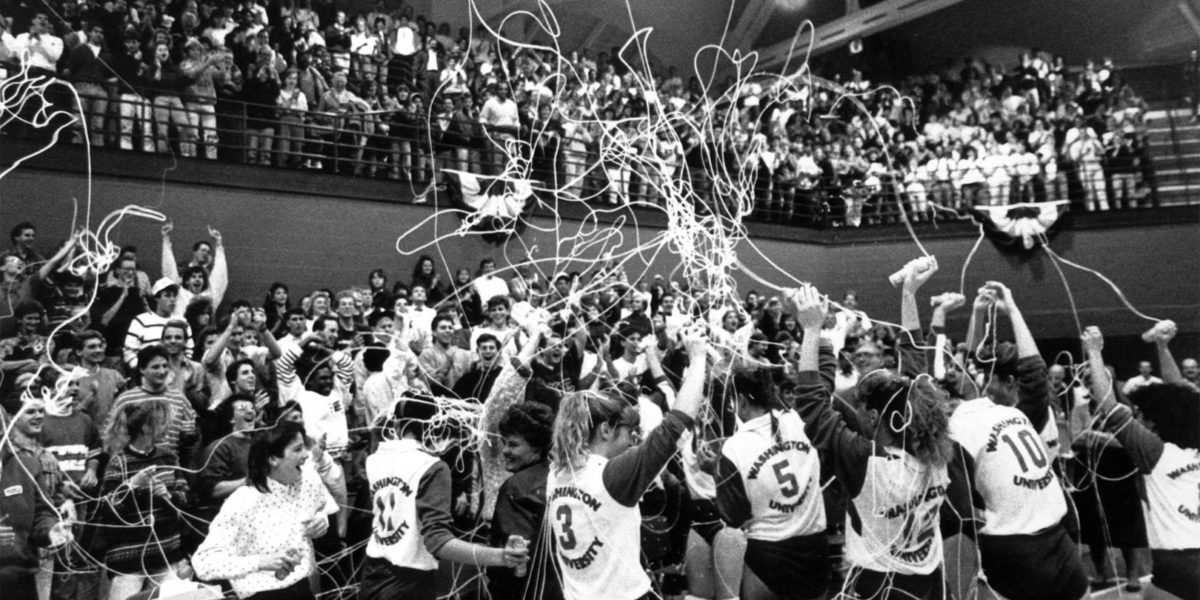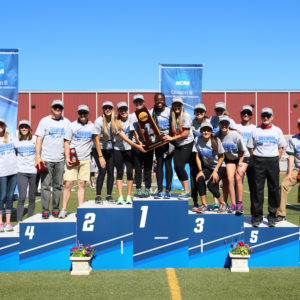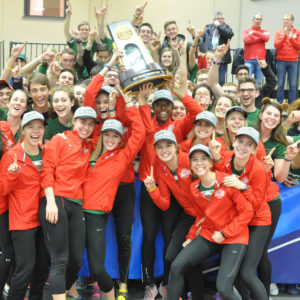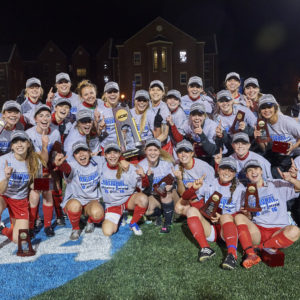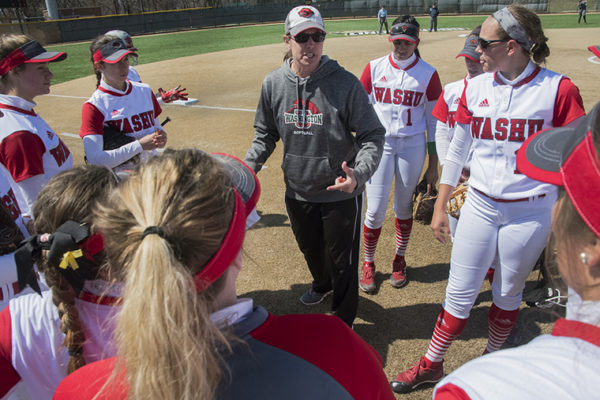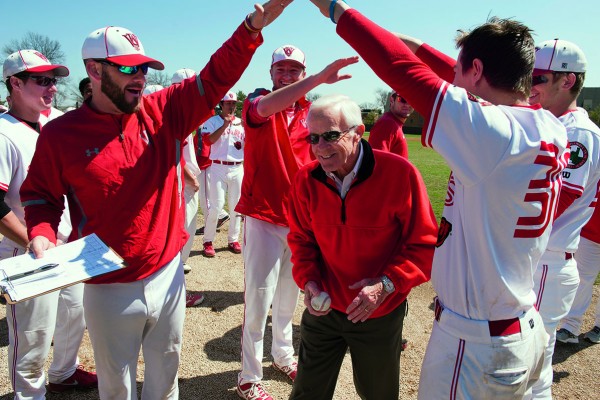To honor the 45th anniversary of Title IX — the landmark legislation that passed in 1972 and forever changed women’s collegiate sports — the NCAA’s Champion magazine in its winter 2016 issue came up with a list of 45 “Magic Moments” from title-deciding games across all three divisions.
And there, ranked at No. 19: the elated, relieved, joyful face of Lindsey Merrill Stigers, BSChE ’01, from March 17, 2001, the day the women’s basketball team beat Messiah College to win its fourth-consecutive title. Nancy Fahey was at the helm, and Tasha Rodgers, BSBA ’01, contributed a career-high 36 points.
The fact that Washington University in St. Louis was included in the list among the likes of the University of North Carolina and its ninth-consecutive women’s soccer championship (1994), the University of Connecticut and the launch of its women’s basketball dynasty (1995), and the University of Tennessee and legendary coach Pat Summitt’s eighth and final title (2008) was not surprising in the least.
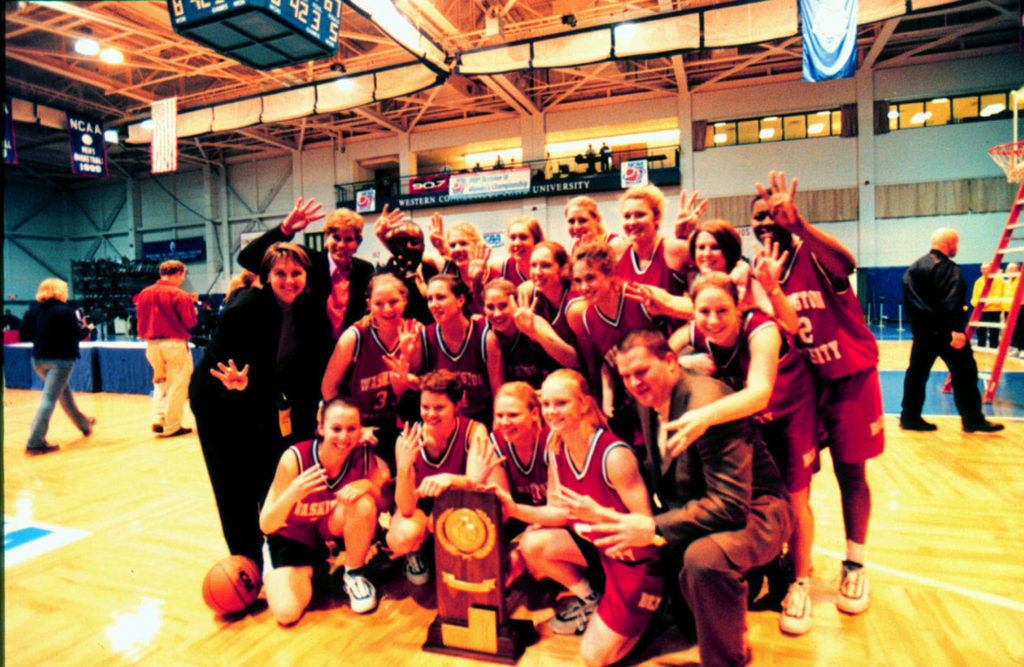
The basketball Bears had won 116 of 120 games during that four-year title run, including 81 straight (seven shy of the all-time men’s record set by UCLA). Fahey’s teams were focused, athletic and prepared. Yet to her, the players — on that team and all the others she coached in her 31-year tenure at Washington University — were always students first, athletes second.
“When I recruited for my teams, I recruited kids for whom basketball was something they did, not something they became,” Fahey says. “They chose to come for the love of the game, and that’s easy to coach. And that’s what I always experienced there.”
And therein lies the key: That the recognition came in the anniversary year of Title IX was secondary to the spotlight it focused on Division III athletics and Washington University’s entire athletic program, both women’s and men’s.
“The impact women have had, and continue to have, on our program is not only amazing, it’s inspiring,” says Anthony Azama, the John M. Schael Director of Athletics. “But that only tells part of the story. What all our student-athletes, male or female, learn from playing sports and being part of a team are positive lifelong lessons — lessons that can’t be achieved in the four walls of a classroom and that last beyond the four years they are here at WashU.”
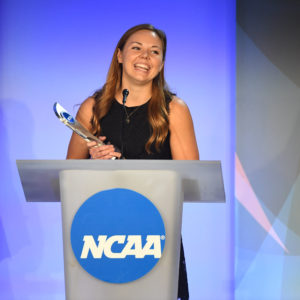
Azama’s right. All the student-athletes at WashU are cut from the same cloth. But this story is about Title IX, so for now the focus will stay on the women. Why? Because it’s the women who have earned 19 of the university’s 22 national team titles, including 10 in volleyball, five in basketball, one in cross country, one in soccer.
It’s the women who have picked up the two most recent national team titles in indoor and outdoor track and field, in March and May 2017, respectively.
It’s the women — two to date — who have been bestowed one of the NCAA’s most prestigious individual honors across all three divisions: Woman of the Year. Runner Elizabeth Phillips, BSBME ’12, earned the award in 2012, and, most recently, women’s soccer player Lizzy Crist, BSBME ’17, picked up the award in October 2017.
But it wasn’t always this way.
‘Some work to do’
Perhaps it was the momentum and energy left over from the 1904 Olympic games being held here on campus, but Washington University was, once upon a time, a place where women could study and play sports. From 1909 until 1955, women played field hockey, softball, volleyball and basketball. But in 1955, the entire program was disbanded for reasons unknown and wouldn’t return for 20 years.
It took Title IX, signed by President Richard Nixon as part of the Education Amendments on June 23, 1972, to nudge universities back to intercollegiate competition for women. When the law was finally enacted in 1975, swimming, tennis and volleyball varsity teams were added for women, with Lynn Imergoot pulling double-duty as both coordinator of women’s sports and tennis coach. By the time John Schael arrived in the summer of 1978 from the University of Chicago as director of athletics, he recalls there being “some work to do.”
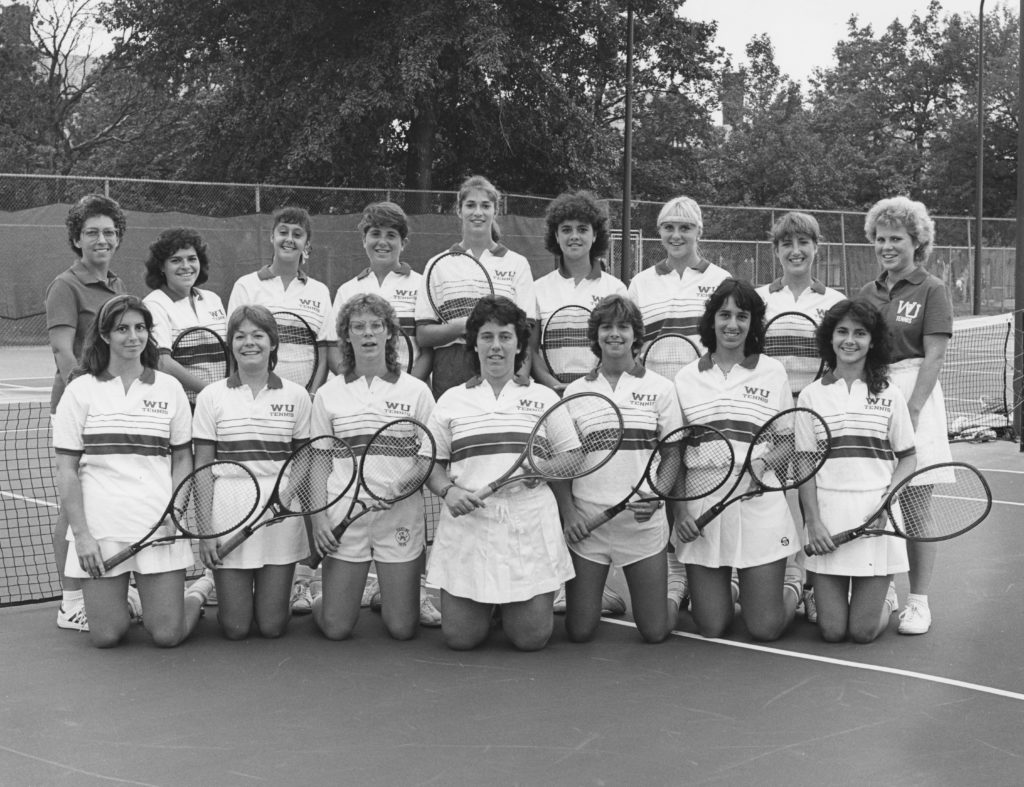
Not from any lack of effort by Imergoot or university administrators. It simply took time, a vision and a tremendous administrative effort to initiate and elevate programs to varsity status.
“I arrived in June 1978, and by September, I had a letter on my desk citing 15 violations of Title IX,” he says. “It felt as if I had hardly enough time to unpack my bags. But I said, ‘Just give us some time to get our feet on the ground, let us make some observations and evaluations, and we will implement a plan going forward.’”
And he did. Women’s cross country and women’s basketball were added the following spring with soccer, indoor track, softball and golf to follow in ensuing years. Sport budgets were equalized. The momentum started to build.
“People think it’s easy just to add a sport,” Schael says, “but it’s not. You need financial resources for full-time coaches and operating budgets for uniforms, equipment, travel. You need facilities (locker rooms, practice and home-game site for competition), support staff and services (including sports information, sports medicine and insurance). We didn’t have any of it, and it all had to be developed.
“It was a big challenge, but a welcome one the whole university embraced,” Schael says. “There was incredible encouragement and support from Chancellor William Danforth and later from Mark Wrighton. Both men embraced Title IX and knew the challenges we faced.”
‘Oh, we can win here’
It would take until the mid-1980s for things to really take off. A $15 million renovation of the Athletic Complex was completed the same year Teri Clemens arrived as the first full-time volleyball coach in 1985. Nancy Fahey was hired a year later. Both coaches were successful high school coaches, but Schael had an eye for talent — and drive.
“That Washington University was a first-class university, that was a given. They were offering me a first-class building in which to compete. John Schael was a first-class athletic director. When you put all that together, I was like ‘Oh, we can win here.’”
Teri Clemens
Clemens recalls jumping at the opportunity. “That Washington University was a first-class university, that was a given,” Clemens says. “They were offering me a first-class building in which to compete. John Schael was a first-class athletic director. When you put all that together, I was like ‘Oh, we can win here.’”
It’s become the stuff of WashU legend, but worth retelling here: Schael says he pointed out to Clemens during her interview that it had been 104 years since the university’s founding and the school was still waiting for its first national title. So he asked her how many years she thought it would take to win.
“I really wanted to coach here,” Clemens says. “I said, ‘It’ll take me five years,’ and he chuckled, ‘Why five? You’ve never won one.’
“It was August. The season was about to start,” Clemens says. “I told him: ‘Well, it will take me four years just to get my own recruits.’ I really believed I could do it. I wasn’t just saying that to get the job.” And Coach Clemens did it in five!
The key, she says, was that Schael had created a climate of support at the university. “John Schael gave me every opportunity to be a coach, not of women, not of men, just to be a coach,” Clemens says.
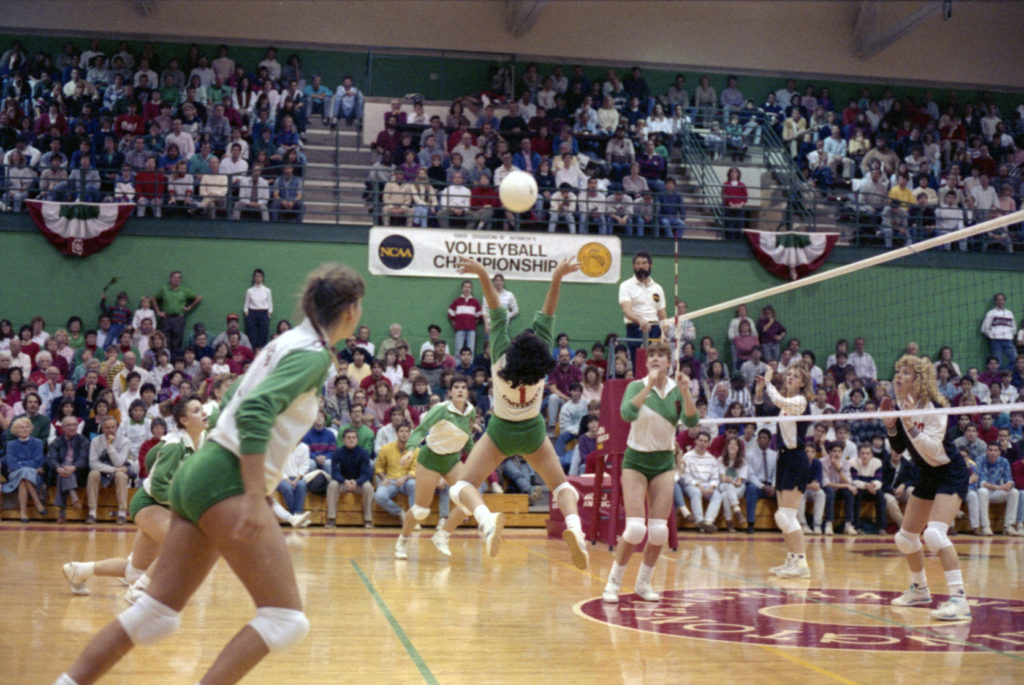
Opening the floodgates
The university’s first national title came on Nov. 18, 1989, in the Washington University Field House. Some 3,200 screaming fans unleashed a barrage of silly string at the moment of the match-winning block by a player Clemens had coached in high school, Kathy Bersett Wight, BSBA ’91. With the win over rival Ohio Northern University, Clemens became the first woman to coach a Division III national champion volleyball team.
That opened the floodgates. The volleyball team would win seven titles under Clemens, including six in a row from 1991–96. She retired in 1999 due to health issues, and the team won three more titles under her successor Rich Luenemann. Fahey would have her four-year championship run (1997–2001), her 81-game–winning streak and then another championship title in 2010. Coach Jeff Stiles quietly built one of the country’s top D-III running programs, and helped the women’s cross-country team win its first NCAA title in 2011, followed by 2017’s indoor and outdoor track and field titles.
And in fall 2016, the women’s soccer team, under head coach Jim Conlon, posted a thrilling, 5-4 penalty kick shootout victory over Messiah College to claim the soccer program’s first national title.
Two teams, one family
Following Title IX, in addition to recruiting top coaches for the women’s teams, Schael helped create the fundraising W Club and helped form the UAA (University Athletic Association), a conference of like-minded, academics-first schools.
From the beginning, Schael also knew the importance of balance and competitiveness in the program. He knew that in order to develop a strong woman’s program, it was important to develop strong men’s programs too.
And that included bringing back men’s basketball, a sport absent from the university from 1971 until 1981. Mark Edwards’ hiring to lead the basketball team was just as important in those early years, as was Joe Carenza’s and Joe Clark’s in soccer and Larry Kindbom’s in football.
“When I arrived at WashU, I knew volleyball; I knew how to coach. But what was new for me was recruiting,” Clemens says. “Mark Edwards really guided me in that regard. He was another who didn’t see male or female; he saw a coach.”
Schael says that all the coaches he hired, across the board, had one goal in mind: to build an athletics program for student-athletes. “And the coaches all learned from one another, got along well with one another and supported one another,” Schael says.
“At our core, both coaches and the administration are committed to our mission of building community, developing champions and impacting lives.”
Anthony Azama
“There was never any jealousy over winning seasons or winning a national championship,” he says. “There was a positive rivalry, and it was motivating within the department. Coaches made kids feel good about themselves, what they were doing and where they were going, and that was a big step in our program.”
Azama agrees and carries that philosophy through the program today: “The track and cross country teams use the mantra, ‘Two teams, one family,’” Azama says. “I like that. Our coaches still lean on one another for insight, input and wisdom. And that results trickle down to our student-athletes and their achievements. At our core, both coaches and the administration are committed to our mission of building community, developing champions and impacting lives. We all play a critical role in creating the very essence of that daily culture.”
Change for the better
And of all the success the women have had for Washington University, Schael says it just might be this moment that set the tone for success, and made the entire athletic program believe in itself. The 1978 men’s soccer team, under Joe Carenza, played for the university’s first national title but fell short to Lock Haven University and finished second overall.
“When Title IX was signed in 1972, it was the ‘Shot heard ’round the world.’”
John Schael
“I thought that team made a strong statement,” Schael says. “To every other team that existed at that time, their comportment said, ‘Hey, we can do this! We can win a national championship. We can be better than we are right now as we move forward.’”
And move forward the program did — and continues to do. “When Title IX was signed in 1972, it was the ‘Shot heard ’round the world,’” Schael says. “People said this was going to change the whole aspect of intercollegiate athletics — and not for the better. I never believed that. It was absolutely for the better.”
Schael continues: “You have to be fair and equitable in this world. Universities acted, and they did it for the right reasons. Now we have wonderful opportunities for both female and male student-athletes across the board, not only at Washington University but throughout the country.”
